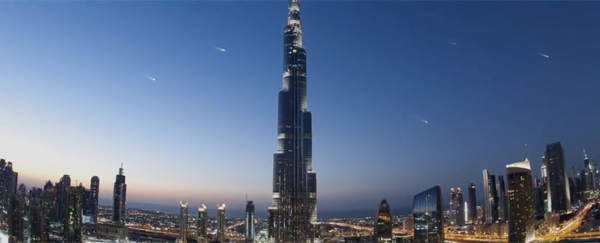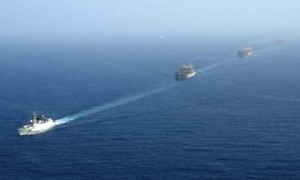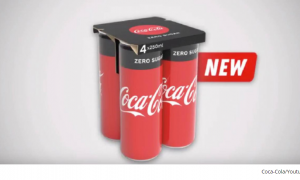
If you thought Russia's recent efforts to prevent rain in the sky from dampening holiday spirits represented the ultimate in scientific stage management, you ain't seen nothing yet.
如果你认为俄罗斯最近为了阻止雨水毁掉节日氛围的努力是高科技舞台管理的极限(为避免五一期间下雨,俄罗斯花百万美元“播云”),那么跟日本人相比,简直小巫见大巫了。
A Japanese research company called ALE Co. (aka Star-ALE) is bidding to put on a sensational pyrotechnics display for the opening ceremony of the 2020 Summer Olympics in Tokyo. But this is no regular fireworks show: ALE Co.'s 'Sky Canvas' is an artificially created meteor shower – uh-huh – which would see hundreds of tiny, coloured fireballs rain down over the host city.
一家叫做ALE CO的日本公司正在筹划在2020东京夏季奥运会开幕式上进行一场举世无双的烟火表演:他们的“天空画布”项目将上演一场人造流星雨,届时将有数百颗彩色火球从天而降。
According to a report at industrial design site Core 77, if ALE Co. has its way, this amazing concept would result in the human-made shooting stars being visible from well outside of Tokyo too, with the next-level pyrotechnics expected to be viewable from up to 100 kilometres away from the city.
根据日本工业设计网站Core 77的报道,如果ALE Co得以实施这一计划,这场人造流星雨在东京以外的地区都可以看到,观察半径达到100公里。
But how does it all work? ALE CO. says it can "artificially recreate" the process of natural shooting stars by sending up a satellite into orbit carrying a payload of between 500 to 1,000 specialised pellets called "source particles".
但是它的原理是什么呢?ALE Co.说他们可以“人工再现”天然流星雨的过程。通过发射一颗卫星进入轨道,搭载500到1000颗叫做“源粒子”的小球。
once the particles – composed of chemicals designed to emit flames in various colours – are discharged from the satellite, they'd travel around Earth until they enter the atmosphere and begin to burn up. With numerous particles being discharged at the same time, the company says it can create a safe, on-demand meteor shower for the wonderment of the crowds below.
这些粒子中包含的化合物可以制造出五颜六色的火焰。粒子从卫星发射出来以后,它们会环绕地球飞行,直到进入大气层,开始燃烧。据该公司称,同时发射大量的粒子,就可以为地上的观众制造一场安全的按需定制的流星雨。
But wonderment comes at a cost, and in this case, that cost isn't cheap. Core77 reports that each combustible pellet comes in at about US$8,100 to produce, and that's not including the costs involved in actually launching the Sky Canvas satellite. Ouch.
效果这么炫酷,烧钱肯定是难免的。Core77报道说每一个可燃烧的粒子的制造成本是8100美元,而且这还没算发射“天空画布”卫星的成本。
The company has tested its source particles in the lab, using a vacuum chamber and hot gases to simulate the conditions the pellets would encounter upon re-entering Earth's atmosphere. In its testing, the particles burn with an apparent magnitude of –1, which should ensure they're clearly visible in the night sky, even in the polluted skyline of a metropolis like Tokyo.
这家公司已经在实验室里测试了源粒子,使用了一个真空房间和高温气体来模拟小球进入地球大气层的情况。在测试中,粒子燃烧时可以达到-1的视星等,足以在夜晚的天空中清晰看到,即使在东京这样污染严重的城市里。
Their speed should also make them easy to appreciate. "Our shooting star travels slower and longer across the sky than a natural shooting star," ALE Co. explains on its website. "This makes it possible for more people to enjoy the spectacle for a longer period of time."
它们的速度也有利于人们观赏。ALE Co在他们的网站上解释说:“我们的流星比天然流星速度要慢,在天空中划过的时间更长。更多的人可以在更长时间里欣赏到这一奇观。”
Of course, a lot of this marketing is just that for now – at least, until the company launches its first shooting-star-laden prototype. It's intending to do that in the latter half of next year, and hopefully by 2018 we'll start to see just how effective human-created meteorites really are.
当然,目前还只是营销造势,至少我们在等待这家公司发射第一颗载流星卫星。他们已经计划在明年下半年发射,所以我们有望在2018年之前看到真正的人造流星雨。
If things go well, who knows? We're calling it: Tokyo 2020's opening ceremony is not one to miss.
如果一切顺利推进的话,谁知道呢?让我们拭目以待:2020年东京奥运会的开幕式不容错过。







